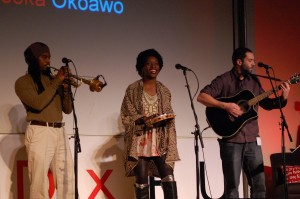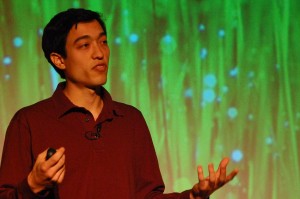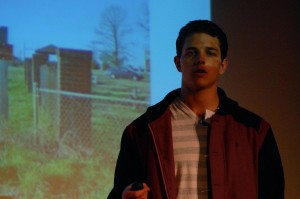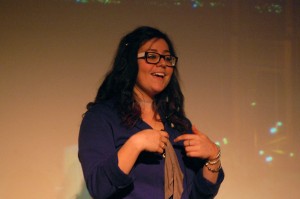By Heather Vandenengel and Allan Lasser
The lecture hall is just about the last place students would want to be on a weekend morning. But on Saturday, more than 300 students packed into the Jacob Sleeper Auditorium for the second annual TEDxBU conference, where 17 Boston University students and professors talked about, well, pretty much everything: the subculture of the New York City subway, why men should be feminists, the existence of God, curing cancer with nanomedicine, meditation and happiness, why we shouldn’t be afraid to drop the “f-bomb” or say the “n-word”, what colors should be used to paint Kanye West’s portrait and how video games can change our lives and much more.
TEDxBU is a locally organized chapter of the larger TED movement that started 25 years ago and has exploded in the last five years since videos of the talks have been made free online. A non-profit organization, TED spreads big ideas through national and global conferences which follow a simple format; the speakers have 18 minutes to talk about their idea and their only props are their voice and a slideshow.
While it started with Technology Entertainment and Design, the conferences have covered pretty much everything in between – from Al Gore’s talk on the climate crisis to Malcom Gladwell’s speech on spaghetti sauce. Sponsored by the Howard Thurman Center and part of the BU Alumni Association’s Winterfest Weekend, the theme of this year’s conference was “Twisted Logic”, which looked at the how deviance from the norms leads to innovation.
Here are some of our favorites from the event. We also got a chance to speak with one of the chairs of TEDxBU, Patricia Garrity, and find out more about SMG sophomore Michael Mark’s Cop Out Collective in our audio interviews, which you can find below.
Iyeoka Okoawo

Halfway through the program, 2010 TED global fellow Iyeoka Okoawo, a Nigerian-American poet, singer, activist and educator, jammed on stage with a tambourine and an incredible voice, backed by Brian Capobianchi on guitar and Akili Jamal Haynes on trumpet. Okoawo spoke about the twisted logic behind her music since all of her songs stand on their own as poems first. While it was more of a TED “sing” than a TED “talk,” her song “The Yellow Brick Road Song”, a soulful and downright catchy optimistic anthem, seemed like it could have been written for the conference.
I know how possible we are/
We can go and achieve the inconceivable/
I know just how possible we are/
We can follow our own yellow brick road/
There’s no tornado that can stop us now/
Her song “Millionaire” brought TEDsters to their feet and had them dancing in the aisles. You can listen to these songs and other tracks on Iyeoka Okoawo’s recently released album, “Say Yes.”
Sarah Merriman (CAS ’12): “Every Woman Is Not a Feminist, But Every Man Should Be”
The worst insults you could hurl at a 13-year-old boy would be to call him gay or a woman, Merriman said to begin her talk. These restrictions are what she called the “man box” – the incredibly strict gender boundaries we give men.
“You know what I’m talking about if you’ve seen an Old Spice commercial,” she quipped.
Women, however, have a fluid way of expressing themselves that doesn’t change their sexuality. Merriman, for instance, is a devoted baseball fan who can proudly cite Red Sox stats with ease. It’s a tragedy, she said, that men do not have the same freedom to express themselves.
Feminism is equality, regardless of gender and sexuality, she said. “The woman’s fight is still going, but the men’s fight is just starting.” She wrapped up by revealing that her talk was not actually about men, but about women and how insulting a man by calling him gay or a woman is equally harmful for women and feminism.
Jeff Zira (MIT 2nd-year MBA): “The Unhappy Truth About Evolution”

“Evolution is at odds with our goal of happiness,” said Zira, the lone non-BU student. “It’s like evolution is playing a big trick on us.” Evolution has hardwired us for survival, not happiness, so we must find other ways of finding lasting happiness.
Zira’s chosen path to happiness is meditation, which he said allows observe negative emotions as they come and then let them fade away. It is possible, Zira said, to reduce the strength of negative emotions and increase the strength of other emotions through the practice of meditation.
He spoke about how six months before he started business school, his mother was diagnosed with cancer. While it was a horrible time for his family, Zira managed to remain optimistic through his meditation which allowed him to talk to his mother about the positive aspects of her life. Zira was also able to change himself through meditation – to change the way he experienced tragedy and the way he experienced happiness. Therefore, developing your own personal happiness is one of the best ways to make other people happy.
Michael Mark (SMG ’13): “Cops, Communities & Cooperation”

Michael Mark, a School of Management sophomore, lectured that police are increasing failing to maintain the ‘heroic’ standard we hold them to. After giving his idea, Mark explained, fairly carefully, why he thinks this failure is happening today: instead of feeling confident and protected, citizens are becoming fearful of police. Mark thinks this is because of police enforcement of policies that are unpopular and occasionally unfair (Mark gave the current War on Drugs as an example).
What was so impressive about Mark’s presentation was that he not only communicated the conflict between the law and everyday people as a flawed, relatable, everyday occurrence, but gave us reasons why he thought so and (more importantly) some ways we can go about fixing the epidemic of corrupt cops. This empowering of the audience was something that was missing from all the talks up to that point.
Mark humorously admitted to being caught tagging a wall, “literally red handed”, by a soft-hearted officer, which put an end to his short-lived career as a graffiti artist. Being treated (more than) fairly by the cop changed Mark’s view of the police; he now sees them not as pigs, but as people (with a few pigs who have snuck in). He introduced his activist group, the Cop Out Collective, which aims to call out power-abusing policemen when they appear. Mark also called on us, the audience, to be more active in our interactions with police, recording their actions using cell phones and digital cameras, to help keep cops honest.
For more information about TEDx, check out their website and out audio interviews with Patricia Garrity and Michael Mark



Hey! I want to bring Tedx back to BU. How can I get involved!